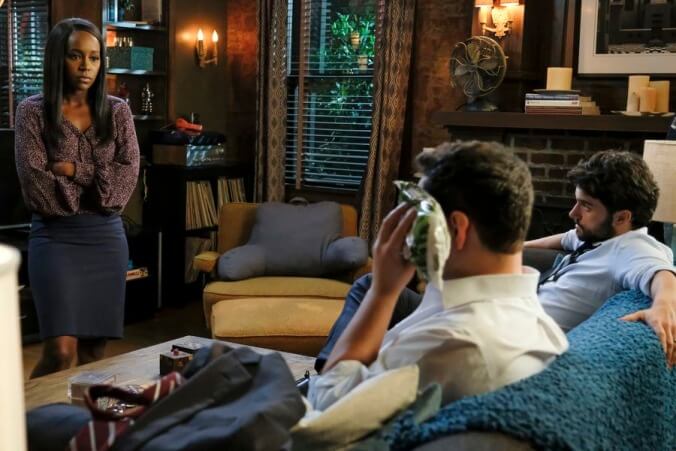There’s a bit of a meta side effect of this: The characters never get to emotionally process what they’ve done, so neither do we. There’s very little healing that happens on this show, and the rare moments of vulnerability and introspection are often the best scenes. “I’m The Murderer” is one of many episodes of this show that cracks under the weight of all its plotlines, unable to really find the emotions beneath its machinations. Most of the biggest emotional beats come from the case of the week rather than from the main characters.
The specific details of the case are messy, to say the least. It pinballs around various issues—school shootings, gun control, LGBTQ discrimination, mental health, race—without landing on any real conclusions about any of them. The schoolteacher David is merely a plot device, and that’s often the case for these one-off characters, but “I’m The Murderer” spends too much time on its case of the week, creating a structural and pacing problem so that the episode never really finds its footing and mostly amounts to a series of well acted but contained scenes and then lots and lots of plot maneuvering. The show continues to bite off more than it can chew…and then keep on eating.
The attention to the actual case instead of on the way it connects to the bigger picture squanders the potential of that observation Asher makes about the group never really discussing everything they’ve been through together and trying to heal. David’s case opens up a conversation about what restorative justice might look like for the group, but we never actually dive into that. On a plot level, the ramifications of Sam’s death keep on going. But the plotting of the characters’ emotional effects in the wake of his death has been all over the place. Most of that is because there are so many plotlines happening at once that the characters get pushed and pulled in different directions all the time, forcing them into new situations that demand a whole new set of stakes and ethos.
While we do spend too much time in it, the case of the week provides a sharp contrast between David and the group. It’s affecting to see how mournful and guilty he is. Certain members of the group (Connor, Oliver, Asher, and Bonnie in particular) have all had similar responses to their wrongdoings in the past, but as far as genuine, selfless contrition goes, that’s not really what this group is about. They’re constantly striving to be better, sure, but they’re mostly striving to pull themselves out of the mess. They want an out not a mend. And it leads them to make more and more bad decisions.
“I’m The Murderer” remembers that Gabriel exists, which has not been the case since his mother left town. How Gabriel factors into the show has been hazy lately, but he takes the lead on this restorative justice case, which is definitely par for the course for his character. And fuel is added to the fire between him, Michaela, and Asher when Michaela breaks up with him and, after a month, tells him it was because she did indeed cheat on him. The plotting here is wonky, played up for dramatic effect so that the love triangle explodes into a fist fight but inorganic in the way it takes some of the focus away from Michaela’s character development and makes Asher and Gabriel into warring dudebros.
In the shadows, there’s still Xavier and the governor, ever-plotting against the group and covering up their own evils. Neither work as a compelling villain precisely because they live entirely in the shadows, trotted out only when it’s convenient and guided by nebulous motives (they just want to preserve their power, which is realistic, but rendered as broadly as it is here, it’s flat and unaffecting). The Nate/Tegan/Bonnie teamup, while getting a decent amount of screentime, doesn’t have much heft to it, feeling more like that plot maneuvering than like genuine character work. Where it lands, though, is more interesting. Bonnie’s in the governor’s crosshairs now, and that creates genuine suspense.
Despite all its talk of restorative justice, “I’m The Murderer” keeps these characters trapped in a state of stasis. They react to what’s happening around them, but they’re still not processing. At this point, there has been so much trauma, so many bad decisions, so many lies that it’s hard to imagine what healing might look like, and I’m not suggesting that How To Get Away With Murder suddenly slap a band-aid on everyone and turn them into better people, but in episodes where the poignant emotional beats are fewer and farther between, the show’s issues with stakes, motives, and character development are easier to spot.
Stray observations
- “I really don’t know you, and you sure as hell don’t know me.” Sorry, Annalise. Welcome to the hell of dating! It requires vulnerability with intimacy with others based on…blind trust!
- “You think everyone is gay,” Oliver tells Connor, which is something my own friends accuse me of constantly.
- It’s sweet that Frank wants Annalise’s approval, but it’s funny how starkly he doesn’t not receive it.
- On that note, Annalise asking Frank to be Bad Frank again is an example of how little Annalise actually cares about these people bettering themselves. I know she thinks she’s doing the right thing by preventing Nate and Bonnie from finding out the truth about Miller, but encouraging Frank to do bad things enables him.
- My interpretation of the flashforward at the end is that Oliver is confessing to something he didn’t do as a way to protect Connor.

